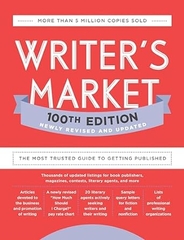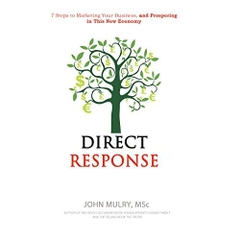-
-
-
Tổng tiền thanh toán:
-
-
Thông tin
-
Tìm sách theo yêu cầu
Seth Godin’s three essential questions for every marketer:
“What’s your story?”
“Will the people who need to hear this story believe it?”
“Is it true?”
All marketers tell stories. And if they do it right, we believe them. We believe that wine tastes better in a $20 glass than a $1 glass. We believe that an $80,000 Porsche is vastly superior to a $36,000 Volkswagen that’s virtually the same car. We believe that $125 sneakers make our feet feel better—and look cooler—than a $25 brand. And believing it makes it true.“What’s your story?”
“Will the people who need to hear this story believe it?”
“Is it true?”
As Seth Godin showed in this controversial book, great marketers don’t talk about features or even benefits. Instead, they tell a story—a story we want to believe, whether it’s factual or not. In a world where most people have an infinite number of choices and no time to make them, every organization is a marketer, and all marketing is about telling stories.
Marketers succeed when they tell us a story that fits our worldview, a story that we intuitively embrace and then share with our friends. Think of the Dyson vacuum cleaner, or Fiji water, or the iPod.
But beware: If your stories are inauthentic, you cross the line from fib to fraud. Marketers fail when they are selfish and scurrilous, when they abuse the tools of their trade and make the world worse. That’s a lesson learned the hard way by telemarketers, cigarette companies, and sleazy politicians.
But for the rest of us, it’s time to embrace the power of the story. As Godin writes, “Stories make it easier to understand the world. Stories are the only way we know to spread an idea. Marketers didn’t invent storytelling. They just perfected it.”
Product Details
Paperback: 240 pages
- Publisher: Portfolio Trade; Reprint edition (April 24, 2012)
- Language: English
- ISBN-10: 1591845335
- ISBN-13: 978-1591845331
- Product Dimensions: 6.9 x 5.1 x 0.7 inches
- Shipping Weight: 6.4 ounces (View shipping rates and policies)
- Average Customer Review: 4.4 out of 5 stars See all reviews (177 customer reviews)
- Amazon Best Sellers Rank: #15,504 in Books (See Top 100 in Books)
Editorial Reviews
From Publishers Weekly
Advertising's fundamental theorem-that perception trumps reality-informs this dubious marketing primer. Journalist and marketing guru Godin, author of Purple Cow: Transform Your Business by Being Remarkable, contends that, in an age when consumers are motivated by irrational wants instead of objective needs and "there is almost no connection between what is actually there and what we believe," presenting stolid factual information about a product is a losing strategy. Instead, marketers should tell "great stories" about their products that pander to consumers' self-regard and worldview. Examples include expensive wine glasses that purport to improve the taste of wine, despite scientific proof to the contrary; Baby Einstein videotapes that are "useless for babies but...satisfy a real desire for their parents"; and organic marketing schemes, which amount to "telling ourselves a complex lie about food, the environment and the safety of our families." Because consumers prefer fantasy to the truth, the marketer's duty is to be "authentic" rather than honest, to "live the lie, fully and completely" so that "all the details line up"-that is, to make their falsehoods convincing rather than transparent. Troubled by the cynicism of his own argument, Godin draws a line at deceptions that actually kill people, like marketing infant formula in the Third World, and elaborates a murky distinction between "fibs" that "make the thing itself more effective or enjoyable" and "frauds" that are "solely for the selfish benefit of the marketer." To illustrate his preferred approach to marketing, the author relates a grab bag of case studies, heavy on emotionally compelling pitches and seamless subliminal impressions. Readers will likely find the book's practical advice as rudderless as its ethical principles.
Copyright © Reed Business Information, a division of Reed Elsevier Inc. All rights reserved. --This text refers to an out of print or unavailable edition of this title.
Copyright © Reed Business Information, a division of Reed Elsevier Inc. All rights reserved. --This text refers to an out of print or unavailable edition of this title.
About the Author
Seth Godin is the author of more than a dozen bestsellers that have changed the way people think about marketing, leadership, and change, including Permission Marketing, Purple Cow, All Marketers Are Liars, Small is the New Big, The Dip, Tribes, Linchpin, and Poke the Box. He is also the founder and CEO of Squidoo.com and a very popular lecturer. He writes one of the most influential business blogs in the world at SethGodin.com.
Most Helpful Customer Reviews
54 of 58 people found the following review helpfulBy Kim Moeller on June 1, 2005
Format: Hardcover
3 Comments Was this review helpful to you? YesNoGodin writes: "This is a whole new way of doing business."
Well, if it is such Seth, then surely You aren't the first marketer to spot this. Therefore, Seth Godin shouldn't take credit for revealing some of the powers of storytelling in marketing.
Other authors were there long before him (e.g. Laurence Vincent, John Simmons, Steve Denning, Christopher Locke, Dave Snowden), who managed to go deeper and further. Mind you though that their individual approaches are very different.
Much of what Godin calls storytelling are simply elements of marketing strategy (already well know to marketers) presented here in a new wrapping called "storytelling". But just because you say so, that doesn't make it so!
Where he writes "You can't out-Amazon Amazon" and "Make your story stand out from the competition", he is simply describing the importance of positioning, and similarly it isn't 'Rocket Science' when he says "Cheap is not marketing". Rather it is leaning up against men like Michael Porter who have been discussing the inherent dangers of price competition for decades.
He does however practice what he preaches. He tells a story that his customers want to believe. It is a pleasant though that success can be achieved simply by telling cute little stories. It is however not as simple as this, which is why I suggest you explore other authors too (See above).
A point I fully agree on is that: "You must aggressively go to the edges and tell a story that only you could tell." However, I don't feel that Godin has followed his own gospel in this case. The story he tells in "All Marketers are Liars" has to a wide extent already been told by a number of other skilful authors.
He still gets 3 stars from me, because I welcome any additions to the body of knowledge available about storytelling in marketing. I believe it is a powerful tool, and it deserves wider recognition.
Well, if it is such Seth, then surely You aren't the first marketer to spot this. Therefore, Seth Godin shouldn't take credit for revealing some of the powers of storytelling in marketing.
Other authors were there long before him (e.g. Laurence Vincent, John Simmons, Steve Denning, Christopher Locke, Dave Snowden), who managed to go deeper and further. Mind you though that their individual approaches are very different.
Much of what Godin calls storytelling are simply elements of marketing strategy (already well know to marketers) presented here in a new wrapping called "storytelling". But just because you say so, that doesn't make it so!
Where he writes "You can't out-Amazon Amazon" and "Make your story stand out from the competition", he is simply describing the importance of positioning, and similarly it isn't 'Rocket Science' when he says "Cheap is not marketing". Rather it is leaning up against men like Michael Porter who have been discussing the inherent dangers of price competition for decades.
He does however practice what he preaches. He tells a story that his customers want to believe. It is a pleasant though that success can be achieved simply by telling cute little stories. It is however not as simple as this, which is why I suggest you explore other authors too (See above).
A point I fully agree on is that: "You must aggressively go to the edges and tell a story that only you could tell." However, I don't feel that Godin has followed his own gospel in this case. The story he tells in "All Marketers are Liars" has to a wide extent already been told by a number of other skilful authors.
He still gets 3 stars from me, because I welcome any additions to the body of knowledge available about storytelling in marketing. I believe it is a powerful tool, and it deserves wider recognition.
21 of 21 people found the following review helpfulBy Larry Underwood on November 18, 2009
Format: Hardcover Verified Purchase
Some marketers may be liars; some may be honest; those who are the most successful, combine honesty with a compelling message. That's the secret to a great marketing campaign, and that's why Seth Godin's book is so interesting. He knows how to tell relevent stories which engage the reader; before you know it, you've read this entire book.
The message Godin is delivering is really quite simple. Marketers should have a good story to tell; if it's a good enough story, consumers will repeat it, and that story has now become entrenched in our minds as "reality". Mission accomplished.
Successful marketers understand the importance of creating demand from telling a good story. However, as Godin warns, the stories had better be authentic; consumers in this day and age of social media are quick to spot the phonies. That's good news for the consumers; and should be good news for the creative marketers, who have good stories to tell. That probably explains why Twitter is becoming so popular; people like stories, especially short ones that are confined to 140 characters or less. Cutting to the chase has never been more important than it is today.
It should also be good news for Seth Godin, because his story is authentic, very witty, and most compelling. I highly recommend reading it for yourself; I honestly believe you won't be disappointed.
The message Godin is delivering is really quite simple. Marketers should have a good story to tell; if it's a good enough story, consumers will repeat it, and that story has now become entrenched in our minds as "reality". Mission accomplished.
Successful marketers understand the importance of creating demand from telling a good story. However, as Godin warns, the stories had better be authentic; consumers in this day and age of social media are quick to spot the phonies. That's good news for the consumers; and should be good news for the creative marketers, who have good stories to tell. That probably explains why Twitter is becoming so popular; people like stories, especially short ones that are confined to 140 characters or less. Cutting to the chase has never been more important than it is today.
It should also be good news for Seth Godin, because his story is authentic, very witty, and most compelling. I highly recommend reading it for yourself; I honestly believe you won't be disappointed.
XEM THÊM TẠI AMAZON.COM
- Thông tin chi tiết
- Mục lục
- Đọc thử
- Đọc thử
- Đánh giá & bình luận của người mua
- Những cuốn sách cùng chủ đề hoặc có liên quan
Tại web chỉ có một phần nhỏ các đầu sách đang có nên nếu cần tìm sách gì các bạn có thể liên hệ trực tiếp với Thư viện qua Mail, Zalo, Fanpage nhé
Đăng ký nhận tin qua email
Hãy đăng ký ngay hôm nay để nhận được những tin tức cập nhật mới nhất về sản phẩm và các chương trình giảm giá, khuyến mại của chúng tôi.












